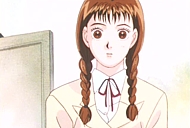
Boys Over Flowers Vol. 1
Supposedly, I don't "get" shoujo. The only truly negative exchange of emails I've had during my time writing reviews was with an old-school fan who thought that shoujo was the perfect form of anime and my less-than-adoring reviews of shoujo properties meant I didn't understand it. Maybe he was right. Most of the time, I've found myself less than pleased with shoujo...the rampant internal dialogues, the "we can do it together as a team" speeches, the all-too-cute characters and the over-the-top drama. That's a stereotype, I know, and I've enjoyed some good shoujo that doesn't follow the rules. But then comes something like Boys Over Flowers, which seems at first glance to embody most every shoujo cliche in the book.
And you know what? It's darn good anyway.
Tsukushi doesn't want to make waves at her new school. Although an excellent student, Eitoku Academy is filled with the "upper crust" of society...and Tsukushi knows she doesn't quite fit. The problem that brings Tsukushi out of her shell is the F4, a group of the four richest boys at the institution. They're mean, they're feared, and they know it...which makes it all the more surprising to them when Tsukushi stands up to their brand of bullying. Though she takes abuse (and a few eggs) from classmates who acts as the F4's henchmen, other students grow to admire her bravery. Of course, no shoujo anime is complete without romantic tension, and so Tsukushi finds herself attracted to Rui, the most reticent and reluctant member of F4. He doesn't seem interested, though, and his friend Tsukasa is willing to spend tons of money (and break kidnapping laws) in order to impress Tsukushi. And when the snobby girls who adore the F4 find out that Tsukushi is making friends within their inner circle, they become determined to break her themselves.
The American release of Boys Over Flowers has a few problems related to the print that I need to mention right away. The show's look is soft, filled with pastel colors and watercolor stylings that look great and lend a slightly unrealistic feel that offsets the more realistic proceedings. I really thought it was unique, and the painterly designs drew me in very easily. However, the print is literally the grainiest anime transfer I've seen. Much has been made elsewhere of the rumors that this show was nearly left unlicensed due to problems obtaining a useable copy from Japan. While the grain rarely distracts from the program, those who are sensitive to this sort of thing will find themselves disappointed -- and because there's little real animated action, there are many still shots that make the grain apparent.
There are other things that may keep the viewer from appreciating Boys Over Flowers, though. The show is quite realistic from a certain perspective; the bullying and bad behavior of some of our antagonists is all too real and at times painful to watch (especially if you went through anything similar in middle school or high school). That makes it difficult at times to accept the unrealistic scenarios the show sometimes presents. It doesn't seem like anybody actually ever goes to class! Meanwhile, teachers seem oblivious to the harrassment of their students. On top of all that, events like kidnapping seem to be readily accepted, even by the victim! Furthermore, the show is highly melodramatic. The music, which is quite lushly classical, underlines each key moment, amplifying the angst. Add in the fact that there really isn't a new thought in this show's head, and you might very well hate Boys Over Flowers.
But if you're like me, you'll find that the show is like comfort food. There's nothing surprising about it -- it just tastes good! In just the same way, the first volume of Boys Over Flowers has a strange knack for fulfilling every expectation right on queue. It's predictable, but never boring. I think this actually says a lot for its characters. The events fall into stereotypes, but the players rarely do. I was interested in learning why Rui would hang out with such a bunch of jerks and what made him one of them. Tsukushi is neither social wallflower or extrovert extraordinare; she's complex, and she doesn't understand why she is the way she is. These kids go through the same things as everybody else, but their unique personalities make them more interesting. The only characters who fall into the trap of being cardboard are the witchy girls who befriend Tsukushi because of their jealousy, and they bothered me.
What's more, the show is both fun and melancholy without overdoing either one. Recently, I've seen shows where every 25 seconds, there's a new slapstick bit, and it gets old quickly. Here, there are some funny "deformed" bits, but they happen so infrequently that they are genuinely funny when they occur. And despite the melodrama, there are times when the show cuts through the cheese factor and makes us feel sympathy for these kids...even the ones we aren't supposed to be rooting for. It's a good show with a lot of elements nicely blended together.
I've given Boys Over Flowers Vol. 1 a slightly lower grade than I personally feel towards it. Why am I second-guessing myself? It's due to the fact that this show is the epitome of all that is shoujo anime...good and bad combined. I'm not sure everyone will appreciate it, seeing how much of it is based in genre expectations. It doesn't defy conventions. But you know what? If you are a shoujo fan, you're going to absolutely love this. And if you're like me, jaded but hopeful about shoujo anime, once you get past the fact that Boys Over Flowers is made with standard ingredients and an old recipe, you'll start to savor the variety of flavors the chefs were able to bring to the dish.
Boys Over Flowers Vol. 1 -- mild language, general bullying -- B+

